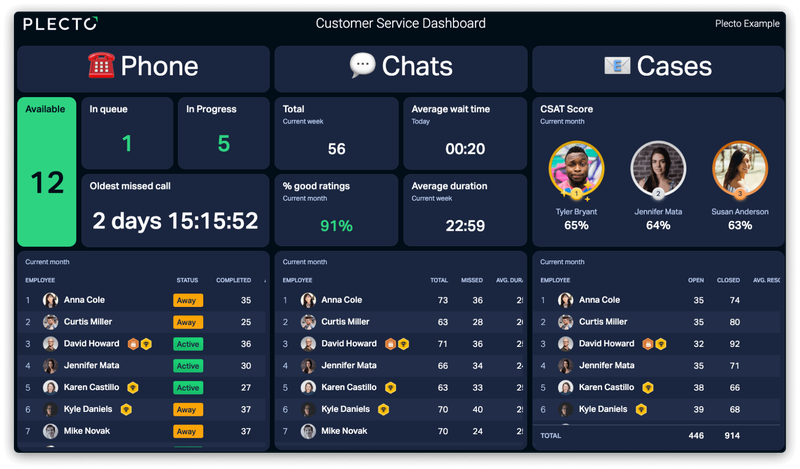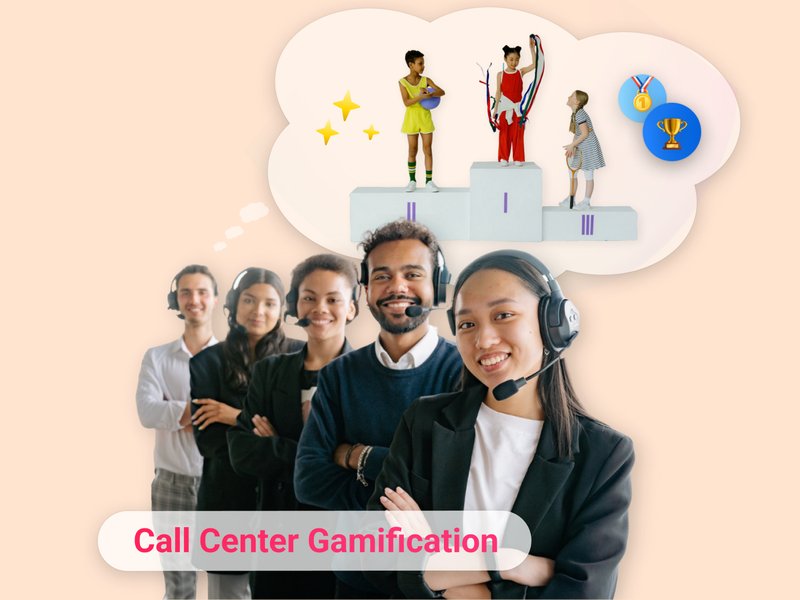The fallout from COVID-19 continues to shape customer service trends into 2024. 93% of customers say they’re more likely to repurchase from companies that offer exceptional service and more than half say that one negative experience would cause them to take their business elsewhere.
Companies are under enormous pressure to provide top-notch customer service if they expect to retain customers today and win new ones in the future. This article highlights the four key elements of great customer service along with eight essential customer service skills for any company that wants to exceed their customers’ expectations and retain market share.
4 Key Elements of Great Customer Service
Delivering stellar customer service means delivering the service that customers want. So, what does research tell us about customers’ expectations in 2024, and how can companies develop the customer service skills necessary to meet these expectations? Following are four key service elements that today’s customers expect and demand.
1. 24/7 access via their preferred channels
According to recent research, 78% of customers expect to engage with companies via their preferred channels. A toll-free phone number doesn’t cut it with today’s customers, many of whom are digital natives who prefer to use the same communication channels they use in their personal lives. Salesforce research shows that 60% of customer-company interactions now take place online, and support is increasingly provided via text-based channels like email (76%), social media platforms (71%), SMS (70%), online chat (70%), and messenger apps (70%). Many companies are ramping up their use of chatbots and other AI-enabled support tools to help them provide convenient around-the-clock support via these channels. If you’re curious about how AI can support your customer service strategy, this article explores the increasing role of artificial intelligence in customer service.
2. Omnichannel support
Piggybacking on customers’ expectations to choose their preferred communication channels, they expect to switch seamlessly between channels. 67% of consumers regularly use at least three channels to engage with a single company and with the expectation they will not have to explain the same issue to different reps. To address this, omnichannel support is becoming the gold standard because it tracks all customer interactions in one place, regardless of how many channels the customer uses. To help with this, systems like Plecto can sync data between a company’s CRM, helpdesk software, and other systems into a “collaboration hub” that provides customer service teams with a comprehensive view of each customer’s interactions with the company.
Build your first dashboard.
Start your 14-day free trial today
3. Self-service tools
Research shows that 42% of today’s customers are willing to use self-service tools to manage their accounts and find answers to simple questions. 75% of customers say they’d like companies to improve their self-service options, suggesting that better quality tools would increase their use. This is excellent news for companies and customer service teams alike! Increased automation is proven to reduce stress and burnout among customer service teams, leading to better retention and reduced hiring and support costs while improving customers’ perceptions of the service they receive – because service is available 24/7 and without a wait!

4. Customer service reps who can make decisions
78% of customers say that’ve had to contact a company multiple times to resolve an issue. This is usually due to internal processes or policies that require customer service reps to escalate issues to a manager before they can resolve them. This increases operating costs – and often, the customer’s frustration with the situation. Companies wanting to provide best-in-class service must empower their reps with the ability to make decisions that can resolve issues faster and more efficiently.
8 Essential Customer Service Skills
While self-service and AI-enabled customer support tools are on the rise, live customer service reps are still a mainstay of customer support operations, and that’s unlikely to change anytime soon. While it should go without saying that a comprehensive knowledge of the company’s products and policies is essential to succeeding in customer service, there are some soft skills that are equally important. Let’s take a look at eight essential customer service skills that can help customer service reps provide the best service.
1. An ability to show empathy
Most customers contact support because their experience with the company’s product or service isn’t meeting their expectations. Showing empathy for the customer’s predicament is one of the most essential customer service skills, and it’s crucial to getting the interaction off to a positive start. Practicing active listening and then showing understanding and compassion by putting themselves in the customer’s shoes is an excellent way for reps to gain trust and build rapport – which helps customers feel less frustrated, more confident that their issue will be resolved to their satisfaction, and more easily persuaded to accept the offered resolution. This article gives 10 tips to help build customer rapport – and the four most common mistakes.
2. Awesome active listening skills
Venting frustrations to silence on the other end of the phone can compound a customer’s dissatisfaction. Using “verbal nods” (e.g., uh-huh, yes, I understand) is one of the best ways for reps to let customers know that they’re engaged. Active listening also helps people process the information they’re hearing, which can help support staff to better comprehend and understand the nuances of the situation. Rephrasing what the customer has just explained is an effective technique for confirming understanding and boosting the customer’s confidence in the rep’s ability to resolve their issue.
3. Ace critical thinking and problem-solving skills
All of the empathy and active listening in the world aren’t worth much if the rep has poor critical thinking skills or is an ineffective problem-solver. It’s not the customer’s job to identify a solution – and sometimes, they haven’t correctly identified the problem. Therefore, ace critical thinking and problem-solving skills are key! This means first looking at what the customer was expecting or unsuccessfully trying to achieve and then identifying what went wrong. This involves listening closely to what the customer is saying, analyzing the situation, identifying the issue, doing any necessary investigation, deciding on the best solution, communicating the solution in easy-to-understand language – and finally, evaluating if it was the correct solution and whether it met the customer’s expectations. It’s important to remember that it’s OK to admit not knowing the answer, knowing how to find the answer is just as important as knowing the answer. It’s better to say, “this is my first experience with this issue, let me ask my colleague” than to give wrong information.

4. High degree of emotional intelligence
Emotional intelligence is one of the most essential customer service skills because customer service reps encounter all kinds of people and they need to be able to decode different personalities and moods, and relate (or give the illusion of relating) to all of them – especially the difficult ones. The most successful customer service reps have an uncanny ability to keep a level head and make the customer feel heard and understood while placating them. This is a crucial skill for deescalating volatile situations and for staying calm and detached in stressful situations or when being attacked. People who have a high degree of emotional intelligence manage to keep a positive tone that shows empathy while staying productive and steering the conversation toward a resolution instead of getting weighed down with negativity.
5. Fantastic communication skills
Customer service reps are the voice of the company, so they must be able to communicate clearly and pleasantly while demonstrating understanding, building trust, and solving problems. Someone who excels in every other skill on this list but mumbles and struggles to articulate and make information easily understood will find it difficult to build rapport and achieve top customer satisfaction ratings. Miscommunication or unnecessary complexity will only contribute to customers’ frustration and dissatisfaction. The most effective customer service reps communicate confidently, as simply as possible, check for understanding and satisfaction, and leave nothing open to interpretation or assumption.
6. Great writing skills
As email, live chat, and other written communication channels surpass the telephone as customers’ preferred way to communicate with companies, the ability to communicate clearly in writing will become one of the most essential customer service skills in the future. The use of correct spelling, grammar, and punctuation is paramount – and so is the correct tone. Because writing lacks the intonation of spoken communication, its tone is susceptible to misinterpretation – in other words, without adequate skill and attention it’s easy to inadvertently come off as abrupt or rude. Written communication also provides instant documentation of the situation and its handling, so accuracy is critical. I recently contacted customer service through online chat to clarify conflicting information given on the company’s website. The rep wrote, “That’s not incorrect.” This only added to my confusion. When I asked, “So, it’s XYZ?” They wrote, “No, it’s ABC.” The rep’s minor typo could’ve caused me to order an expensive and difficult-to-return product, which would’ve been extremely frustrating and inconvenient – and led to a negative review and bad word-of-mouth.
7. Capacity to stay cool under pressure
Customers rarely contact support because they’re satisfied. At some point, every customer service rep will encounter an irate or perhaps even a hilariously unreasonable customer. One misplaced word, particularly in written communication where there’s proof, has the potential to blow up on social media and cause an avalanche of negative attention. Therefore, customer service reps must resist being provoked even when customers are unprofessional and personally attacking them. For the most part, customers face zero repercussions for bad behavior. Conversely, bad behavior by a customer service rep can have dire consequences for the company’s reputation.
8. Ability to adapt
Customer service is truly a job where no two days are alike. Inquiry volume naturally ebbs and flows and so do the types of inquiries – and even the personality types of customers needing support. As companies offer more communication channels, reps may also find themselves switching from phone to email to online chat as customers request support. All of this requires people who can adapt to ever-changing situations with a level head while thinking on their feet. Reps who’ve mastered all of the previous skills on this list will find it easiest to adapt because they’ll have a solid foundation based on a toolbox of essential customer service skills that make it easy to deal with whatever comes their way.
Use Plecto to Improve Customer Service
Plecto includes built-in features like leaderboards, contests, and instant notifications to help motivate your team to provide service that meets or exceeds customers’ expectations.
Plecto also enables you to monitor your call center’s real-time performance and makes it easy to create dashboards that visualize key metrics in one place.




